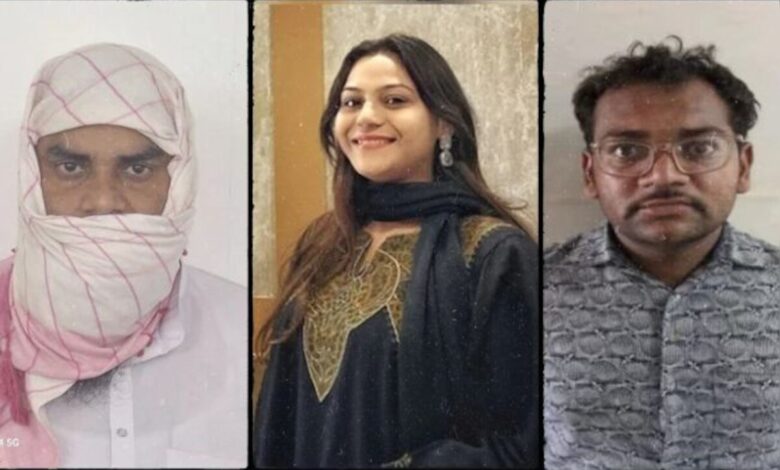Latest NewsPolitical
The Spy Next Door: How Ordinary Indians Became Pakistani ISI Assets
A Mumbai engineer drawing blueprints for warships after having been honey-trapped on Facebook, a Haryana travel blogger accompanied by gun-toting men through markets in Lahore, India has arrested a number of individuals over the past few weeks.

New Delhi:
Since the wake of the Pahalgam terror attack and India’s counterstrikes under Operation Sindoor, Indian counterintelligence agencies have been on tenterhooks. At least 15 people across Rajasthan, Maharashtra, Delhi, Haryana, Uttar Pradesh, Gujarat, and Punjab have been arrested or rounded up in the last month.
A Mumbai engineer drawing warship plans after being honey-trapped on Facebook, a Haryana-based travel blogger escorted by armed men through Lahore bazaars, a government official in Rajasthan with seven mysterious trips to Pakistan, and a SIM card dealer in Deeg channeling information to Pakistani Inter-Services Intelligence (ISI) handlers – every arrest, unrelated but redundant, documents a vast web of individuals involved in forwarding sensitive information to Pakistan.
The CRPF Insider: Moti Ram Jat
Moti Ram Jat was not a senior officer, but his proximity to operations in the Central Reserve Police Force gave him a profile that could be targeted by Pakistani operatives. The National Investigation Agency (NIA) claimed that Jat had been in touch with the Pakistan Intelligence Officers (PIOs) since 2023, sharing sensitive information for monetary compensation.
The NIA
had picked up Jat from Delhi last month following his social media activity, which raised internal alerts. The CRPF, in a rare public admission, said Jat was relieved after he was found to have “acted in defiance of established norms and protocols.” Jat is still in NIA custody until June 6. Investigation continues to find out what information he communicated to India’s nuclear-capable neighbour.
Honeytrap At The Dockyard: Engineer Ravindra Verma
In Maharashtra, the Anti-Terrorism Squad (ATS) arrested 27-year-old Ravindra Verma, who is a mechanical engineer working for a Mumbai-based defence technology company. Verma had access to the Naval Dockyard in south Mumbai and was engaged in work related to submarines and warships.
His arrest was
prompted by a forensic trail leading to Facebook profiles with the names “Payal Sharma” and “Ispreet.” According to investigators, these accounts were covers for Pakistani agents who led Verma into a honeytrap slowly. Verma started leaking detailed sketches, diagrams, and voice notes regarding naval assets in return for payments through Indian as well as international bank accounts. As per the police, Verma was not just cheated but repeatedly and knowingly shared sensitive information. Though phones were banned within the Naval Dockyard, he would draw from memory and later send photos. The ATS suspects that he also provided ship names and port schedules. He had been in touch with the Pakistani handler since November 2024 and is now in custody.
The Influencer Asset: Jyoti Malhotra
One of the most widely known is that of travel blogger Jyoti Malhotra, whose popular YouTube channel was shut down after she was arrested by Haryana Police in mid-May on charges of her connection to ISI agents. Malhotra had regular repeated contact with the operatives of the Pakistan High Commission in Delhi, and also while visiting Pakistan, at least two of which have been certified by travel documents. She is said to have met Pakistani intelligence officers Danish, Ahsan, and Shahid. Forensic analysis of her confiscated cell phones and computers yielded a treasure trove of more than 12 terabytes of material, including messages that prosecutors say confirm her knowledge of the agents’ ISI connections. In spite of the criticism for disproportionate expenditure and foreign travels in bulk, including to Pakistan and China, Malhotra persisted with interactions with suspected handlers. One incident recorded in a video by Scottish YouTuber Callum Mill was of her walking with six men armed with AK-47s through Lahore’s Anarkali Bazaar.
Malhotra has been
prosecuted under the Official Secrets Act and the provisions of the Bharatiya Nyaya Sanhita. Her trial will commence in June.
The Health Worker: Sahdev Singh Gohil
A 28-year-old health worker from Gujarat was arrested for passing on sensitive details regarding Indian military installations to a Pakistani agent. Gujarat Anti-Terrorism Squad (ATS) officials confirmed last Saturday that Sahdev Singh Gohil, a native of the border district of Kachchh, was arrested earlier this month on charges of disseminating classified photographs and videos of recently built Indian Air Force (IAF) and Border Security Force (BSF) facilities to a foreign agent. ATS senior officer K Siddharth stated that Gohil also got in touch with an individual who introduced herself as Aditi Bharadwaj through WhatsApp in 2023. Gohil is now suspected by investigators to have been in contact with a cover identity provided by a Pakistani spy. ATS sources say that the communication later turned into an exchange of images and information related to Indian defense installations on the border. As per officials, Gohil had obtained a fresh SIM card with his Aadhaar credentials in the first half of 2025 and opened a WhatsApp account in the name of the suspected handler through the one-time-password (OTP) verification process. This platform, the officials claim, was then used to share sensitive material recording military construction and activity in the region.
The ATS
further stated that Gohil was paid Rs 40,000 in cash by an unknown person.
The Haryana Arrests
In Haryana, there has been a spate of arrests which indicate an ISI recruitment drive among economically unstable young men.
Davender Singh Dhillon, a 25-year-old political science student from Patiala, was arrested after uploading pictures of firearms online. Investigation revealed that he had visited Pakistan in November 2024 and shared sensitive images of military installations.
Nauman Ilahi, a 24-year-old security guard, was arrested in Panipat. He had reportedly been transferring information to ISI handlers using his brother-in-law’s bank account. Authorities confirmed cross-border money transfers.
Arman, 23, and Tarif, both
Haryana’s Nuh district natives, were detained within days of one another. Tarif was apprehended attempting to erase Pakistani numbers from chats when police reached his home.
The Bureaucratic Link
Shakur Khan, a government official in Rajasthan from Jaisalmer, was detained on charges of spying. Khan, 49, was once a personal assistant to former Rajasthan minister Shale Mohammad in the Congress-led Ashok Gehlot government‘s tenure. Both of them hail from villages that are a mere 8 km distant. Mohammad, a two-term legislator and cabinet minister, has run four state elections and is known to have had ties with the ‘Pir Pagara’, a designation given to the chief of the Muslim Sufi order of Hurs in Pakistan’s Sindh
Khan had
come to Pakistan at least seven times. His online trail indicated erased files and suspicious financial transactions. His contacts are now also being investigated in depth by central agencies.
The Digital Front: SIM Cards and Apps
In another case, Delhi Police detained Kasim, who is 34 years old from Rajasthan’s Deeg, on charges of providing Indian mobile SIM cards to PIOs. He had visited Pakistan twice between August 2024 and March 2025 for extended periods. The police claimed that Kasim provided illegal export of Indian SIMs, which were further utilized by ISI officials to call Indians and seek military data.
Kasim
confessed to wiping off all sensitive information after the Pahalgam attack, fearing exposure once nationwide arrests started. But police are carrying out a forensic examination of his devices and call data records to track his network.Another arrest
from Thane was of an unknown person in Mumbai. He also was approached through Facebook and WhatsApp and shared sensitive info between November 2024 and March 2025.The Businessman and the Techie
In Uttar Pradesh, businessman Shahzad from Rampur was arrested by the Special Task Force in Moradabad. Shahzad had allegedly provided inputs to handlers during a series of trips to Pakistan and was involved in smuggling consumer products. Mohammad Murtaza Ali was arrested in Jalandhar after he allegedly used a mobile app he had created to transmit sensitive information to ISI agents. Four mobile phones and three SIM cards were confiscated from his house by investigators.
Apart from these established cases, two more persons from Punjab, Gazala and Yamin Mohammad, are being investigated by police and intelligence agencies on similar charges. Both, according to the authorities, were in contact with foreign agents and are suspected of leaking sensitive information.
Post-Sindoor Vigilance
India’s counter-intelligence has been redefined in the aftermath of Operation Sindoor. Launched in response to the Pahalgam attack that claimed 26 lives, the operation involved India targeting terror camps in Pakistan and Pakistan-Occupied Kashmir. The following retaliatory raids by Pakistan, including drones and missiles, were mostly neutalised by Indian defences.
Since then,
monitoring in border states and key sectors has increased. In Rajasthan, seven suspects have been interrogated in just Jaisalmer in the past month, according to police. In Haryana, officials have started checking financial transactions and travel history of people in high-risk professions.





